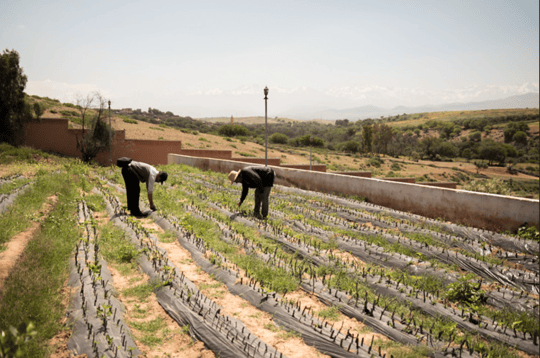2018 HAF Moroccan milestone: 1.4 million trees and seeds planted

An old Moroccan proverb, “One hand can’t clap,” embodies both the approach to and application of the work implemented by The High Atlas Foundation (HAF). HAF is made up of a team of people dedicated to empowering Moroccans by engaging them in the process of achieving sustainable change for their communities. This year may not even be halfway over, but 2018 has already been abundant with accomplishments due to the collective hard work of HAF staff and Moroccan people.
In tandem with Morocco’s planting season starting in early January, HAF kicked off 2018 with its annual tree-planting event on 1/15/18, during which 3,000 trees were planted with 57 schools in 10 provinces across the country. The planting season, which lasted through March, has been extremely fruitful—both literally and figuratively. Dr. Yossef Ben-Meir, HAF’s founder and president, reflected on this year’s milestones. “We replanted [organic fruit trees] to the maximum extent in HAF’s 11 nurseries and opened three new ones, totaling 1.4 million seeds that were placed in the ground by farming families, children, women, and men—young and forever young.”
Since January, HAF has transplanted approximately 225,000 organic fruit saplings from its nurseries located in seven provinces (Al Haouz, Azilal, Fes, Ifrane, Moulay Yacoub, Oujda, and Taroudant) into farmers’ fields and schoolyards. HAF also continued to plant seeds and cuttings in HAF nurseries, for which data had been collected since last April to track one year’s worth of planting: a total of 53,000 seeds in Oujda; 462,483 in Fes; 200,000 in Ifrane; 100,000 in Azilal; and 394,700 in Al Haouz. In addition, HAF has distributed 190,872 trees of different fruit and nut varieties to 156 schools (7,341 trees), farmers (183,501 trees), and a Jewish cemetery (30 trees) since December 2017.
Notably, the value of these figures goes far beyond the raw number of planted and distributed seeds and trees, which are indeed impressive. Rather, the value of planting and distribution intrinsically lies in the empowerment of and unity among local people, eventual economic growth, improved livelihoods of communities, and the offset of severe environmental challenges; the participation of HAF in Morocco’s planting season are undeniably immeasurable. “It took our team and partners 11 years to plant our first million trees and seeds, and to now have planted 1.4 million in a single year shows that passion and good actions spread from person to person, place to place, region to region, world to world,” Dr. Ben-Meir proudly proclaimed.
HAF has deep gratitude for all of its existing partnerships with government agencies and delegations, universities, associations, and other nonprofit organizations, which help maximize HAF’s impact on Moroccan communities. In particular, the High Commission on Waters and Forests, Project PUR, and Ecosia directly benefit HAF’s agricultural programs.
Specifically, the High Commission of Waters and Forests and their regional administrations—particularly the Marrakech and Ouezzane regional managements—have been exemplary in their partnership and contributions to community tree planting by contributing trees and land. Their generosity provides farming families opportunities to plant and better secure both their livelihoods and environment for many decades to come. Project PUR is another valuable partner as they provide fruit trees for communities in the Ourika Valley of the Al Haouz province. Additionally, they assist with monitoring and registering for securing carbon credit certification. HAF is grateful for their close teamwork that has built capacities to track planting accomplishments. Last, but certainly not least, the German social enterprise Ecosia has made HAF’s and its community partners’ planting season in Morocco “one that we will never forget,” described Dr. Ben-Meir. “They allowed us to create new nurseries, to plant as expansively as possible, and to respond to the organic fruit tree needs of people and schools wherever they are in the nation. That kind of support has been the greatest gift of 2018.”
Yet, this year is far from over and there are plentiful prospects of agricultural development—both known and unknown at this time—for which HAF will certainly undertake. As Moroccan farmers consistently voice their desire to transition to cash-crop farming and also identify agriculture as a major Moroccan employment sector, tree planting as well as establishing fruit tree and plant nurseries are two ways in which HAF supports farming communities. These ongoing agricultural projects will contribute to continuously increasing the impact on tens of thousands of Moroccans and rural household incomes.
Further, it is never too early to identify goals for the upcoming planting season in 2019. As Dr. Ben-Meir reflected, “The end of planting seasons seem to always end with a sense of relief and fulfillment as well as with thoughts of what could have been.” He eloquently deliberated, “What if we were to plant in every land grant that has been so kindly given to us? What if we planted with every family that asked and would most welcome this opportunity that keeps giving for generations? What if we would have planted as much as what is really possible and absolutely needed by the people, in order to overcome harsh conditions of poverty?” The aim of every subsequent planting season is to address such open-ended questions—to identify sustainable solutions for organic agriculture and environmental development. “We do all we can to ensure the next planting season results in every field filled, and every need embraced and allowed to exist no more,” Dr. Ben-Meir explained. Considering HAF staff’s tenacious work ethic and genuine passion, it is without a doubt that the organization’s mission will continue to be fulfilled for not only the remainder of 2018 but also for many years to come.